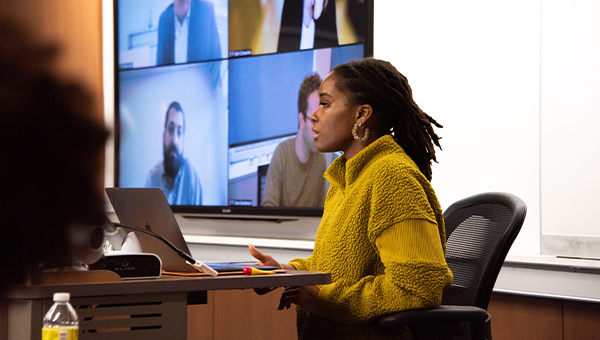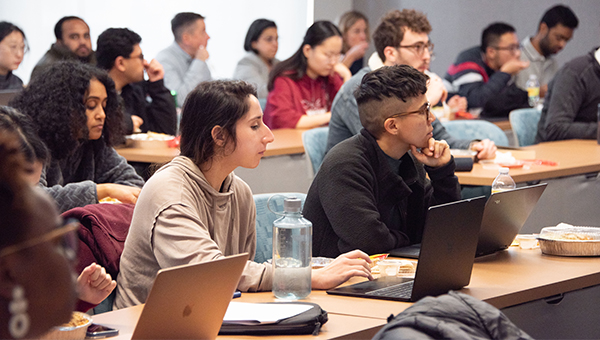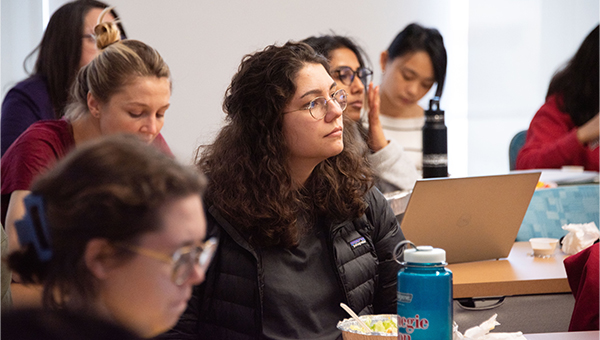Deliberative Discourse Initiative
Deliberative discourse Framework
The role of a higher education institution and college, particularly one that focuses on
policy, is to ensure that we foster spaces that encourage the growth of informed, engaged citizens prepared to participate in the work of our democracy. Success requires working with, and leading across, differences. More specifically, it requires skills in deliberative discourse.
Deliberative discourse is a form of communication in which participants engage in a discussion with the goal of reaching a decision or coming to a mutual understanding. It is characterized by a focus on reasoning, the exchange of ideas, and an effort to consider multiple perspectives.
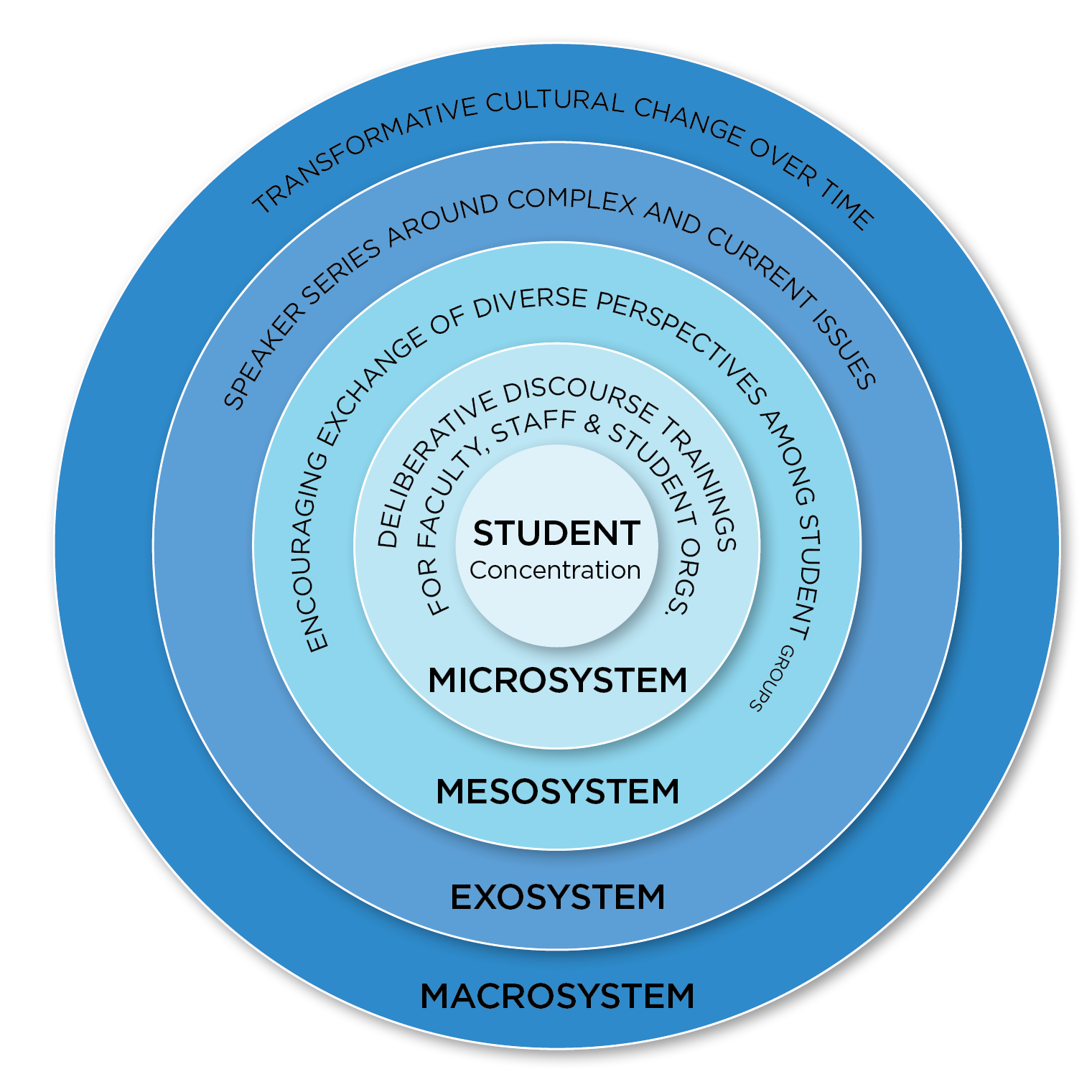
To address the challenges ushered in by polarization on campuses, Heinz College developed a multisystemic intervention informed by Urie Bronfenbrenner’s socio-ecological development model, that seeks to embed and integrate deliberative discourse skills into multiple parts of the student experience, leading to a demonstration of the following:
- Increased exchange of diverse ideas and perspectives across the college
- Increased awareness of personal and professional barriers that prevent working across differences
- Increased skills that demonstrate complex and nuanced discourse to solve critical problems
Our Efforts & Events
Leading Across Differences
Humans of Heinz
A series highlighting diverse backgrounds, challenges, and triumphs in our community
Humans of Heinz EventsConversations at the Crossroads
Technology, Rights, and Public Discourse
Conversations at the Crossroads EventsConstructive Dialogue - Heinz x GSPIA
Fostering open dialogue for productive conversations on complex topics
View events
-
Leading Across Differences Concentration
To lead during a time in which polarization divides us like never before, we must move beyond words and embrace action. Heinz College’s Leading Across Difference (LAD) concentration equips you with the tools to engage in deliberative discourse, and translate those conversations into policies and actions that advance social good.
This concentration provides education and experiential learning in the practice of deliberative discourse to students, faculty, staff, and the community. This holistic approach will result in culture change over time. You'll take classes in conflict resolution, negotiation, and leadership, a course load that builds toward the LAD skills lab. Here, you employ the characteristics of deliberative discourse – beginning with a goal in mind and debating different points of view about how to achieve it – to solve complex current issues. You'll hear from experts in the field and collaborate in groups to produce policy reform recommendations that address a real-world problem.
Offered to members of all Heinz College educational programs, the Leading Across Difference concentration prepares you to navigate a workplace, industry, or society that suffers from division due to the stark contrast in the beliefs of its constituents. Upon completing the concentration, you'll possess the skills to facilitate discussion and harness the resulting collective wisdom to take action. Because it is action that creates impact—and impact is the goal toward which our graduates strive.
- 94-854: Developing as a Leader
- 91-869: Conflict Resolution
- 94-900: Negotiation
- 94-897: Leading Across Difference
The first three courses can be taken in any sequence, and are prerequisites to the Leading Across Difference course. Leading Across Difference is a new class grounded in experiential learning that engages students and members of the community in skills practice around solving complex problems.
Learning Outcomes:
- Cultivate cultural intelligence and responsiveness.
- Deepen negotiation and resolution across difference.
- Hone your leadership capabilities in managing diverse teams.
- Gain a competitive edge in the global job market.
-
Humans of Heinz
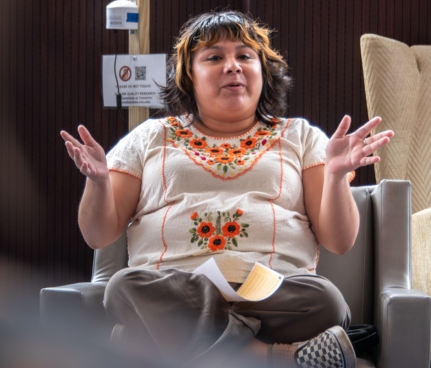 Humans of Heinz is a series that highlights the diverse backgrounds, challenges, and triumphs of individuals or groups in our community to foster a deeper understanding of the experiences that shape who we are. We invite students, faculty, and staff to share their personal stories in a safe, respectful, and empathetic space. This year, we want to allow the audience to drive the conversation, shape the narrative by addressing the issues that weigh on them the most.
Humans of Heinz is a series that highlights the diverse backgrounds, challenges, and triumphs of individuals or groups in our community to foster a deeper understanding of the experiences that shape who we are. We invite students, faculty, and staff to share their personal stories in a safe, respectful, and empathetic space. This year, we want to allow the audience to drive the conversation, shape the narrative by addressing the issues that weigh on them the most.The Humans of Heinz Series aims to:
- Elevate the identities and stories of Heinz students, faculty and staff.
- Honor individual experiences and reduce bias and generalizations about communities of people.
- Connect with the humanity and individual impact of global, national and local events, policies and structures
Upcoming Events:
Check back soon for details about upcoming events.
Past Events:
Unfriended Over Politics? (Oct. 2024)
With elections approaching, this gathering aims to explore the stress of navigating differing opinions with friends, family, and public figures.Our Authentic Selves (April 2024)
Throughout the series, we’ve had discussions that connect to the identities we hold and how those impact our interactions with current events and our communities. Our final session of the year will focus on how we uphold and perhaps protect our identities as well as how we show up as our authentic selves.Your "American" Dream (March 2024)
Discussion of the ideal that in the US, everyone has the equal opportunity to achieve success and prosperity through hard work, determination, and initiative. Who is the American Dream actually for?
Community Post-Covid (Feb. 2024)
The lasting personal and professional effects of the COVID-19 Pandemic–the good and the bad. We aim to discuss the ways in which this global health emergency has altered our view of ourselves and how we interact, the lives we lead, and the world.Reflections on Israel & Palestine (December 2023)
Reflections on Israel & Palestine: how identities shape experiences - reflections on the events of and following October 7, 2023. - Elevate the identities and stories of Heinz students, faculty and staff.
-
Conversations at the Crossroads
The Politics and Expectations of Institutional Accountability
This is the second part of the Accountability in the Age of Ambivalence series, which aims to cultivate meaningful conversations across personal, institutional, national, and global domains through the lens of accountability. This session turns the spotlight toward institutions and asks: Within a political and politicized environment, what expectations of accountability and participation exist for institutions, particularly academic ones? When should a university remain neutral? When is neutrality a form of complicity? As students demand accountability — from divestment to statements of solidarity — what principles should guide institutional action?
Date: October 23, 2025
Time: 12:30-1:50 p.m.
Room: HBH A301Past Events:
Understanding Accountability Through Personal and Intellectual Responsibility
This first part of a four-part series will explore how we as individuals navigate complex, polarizing issues in the face of personal bias, misinformation, and responsibility. While systemic and institutional dynamics shape our conversations, this session centers on the choices we make as individuals — how we show up, listen, speak, and engage with one another in the face of complexity. The session will also initiate considerations of the tension between free expression and empathy in today’s hyper-mediated, often polarized campus climate. What responsibilities do individuals have to seek truth, combat misinformation, and remain open to nuance? How do we avoid collapsing into apathy or outrage without understanding?
Moderated by Dr. Dareen BasmaBalancing Discourse: Rights and Responsibilities in the Age of Social Media
Navigating Free Speech and Regulation on Digital Platforms (Fall 2023)
How does an organization’s right to regulate discourse on their platform interfere with a user’s First Amendment right as outlined within the United States Constitution? As experts in both technology and public policy, the question we pose to you is: What is the right approach and how can we go about implementing it
Moderated by Professor Ananya Sen.Threats to Electoral Integrity: Preventing Manipulation of Candidates' Messages
Technology Solutions and Policy Frameworks for Secure Elections (Fall 2023)
What role does technology play in detecting and preventing manipulation fo candidates' messages, and how can regulatory frameworks adapt to the evolving threat of digital disinformation? As experts in both technology and public policy, the question we pose to you is: Can technology alone solve the problem of electoral misinformation, or do we need a multi-pronged approach?
Moderated by Zeve Sanderson, Executive Director of NYU's Center for Social Media and Politics. -
Heinz x GSPIA - A Constructive Dialogue Collaboration
Heinz College works with our policy colleagues at the University of Pittsburgh's Graduate School of Public and International Affairs to offer the following events:
AI, Ethics, and Policy: Who bears the responsibility when machines cause harm?
When AI systems make mistakes or cause harm, who should be held responsible – the developers who design them, the organizations that deploy them, or the regulators who oversee them? This panel brings together experts in technology, ethics, and policy to unpack this question. This event is the first installment of the “Discourse, Dialogue, and Policy” series, a collaborative and continued effort between Heinz College’s School of Public Policy and Management and the University of Pittsburgh’s School of Public and International Affairs to advance dialogue on today’s most urgent public policy questions.
Panelists:
Rayid Ghani, Distinguished Career Professor, Machine Learning Department, Heinz College
Erin Dalton, Director Allegheny County Department of Human Services
Kirsten Martin, Dean of Heinz CollegeModerated by: Professor Jeremy Weber
Date: September 11, 2025
Time: 12:30 PM - 1:50 PM
Room: HBH A301Past Events:
Paradox of Tolerance and the Current Socio-Political Climate (November 2024)
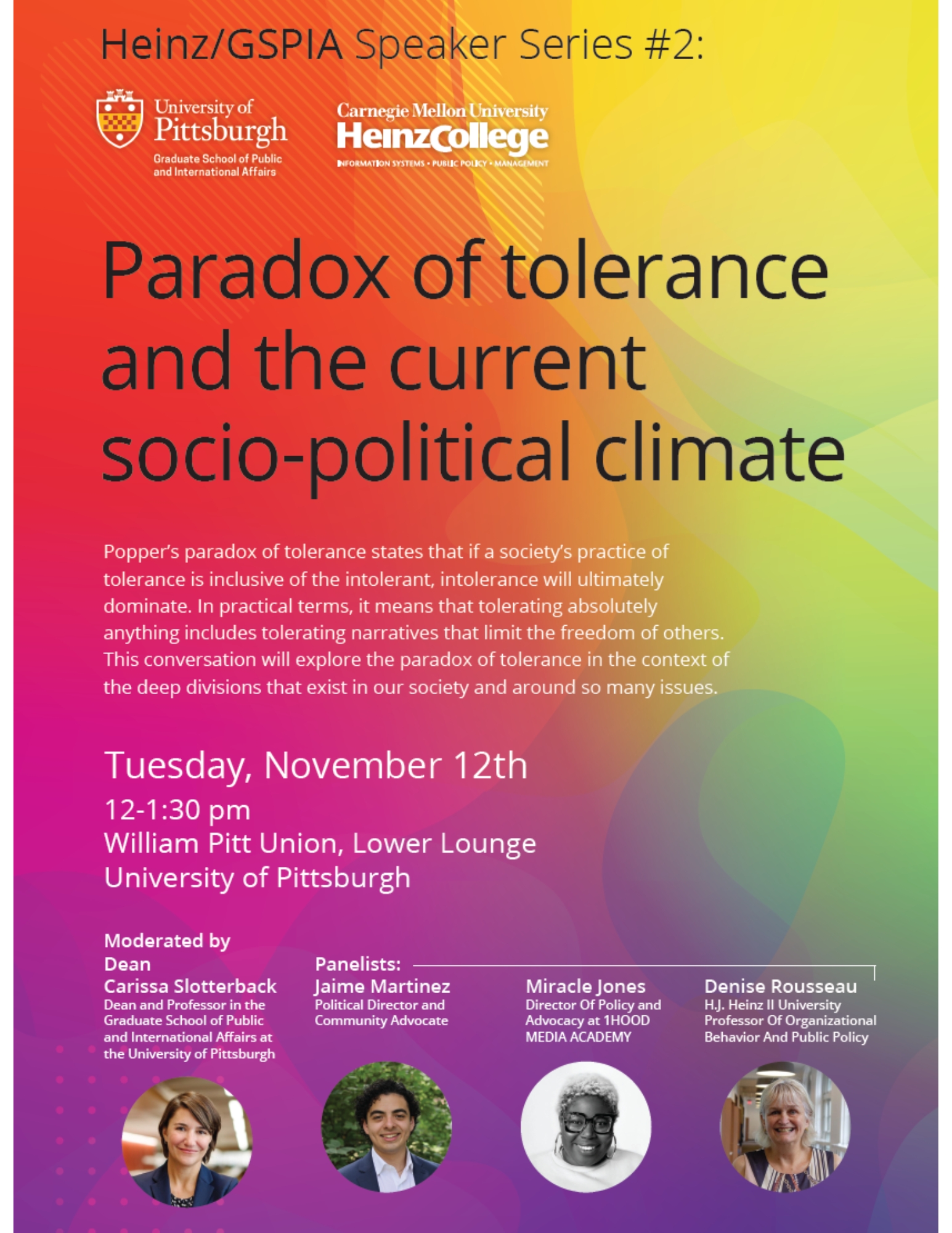
Popper’s paradox of tolerance states that if a society’s practice of tolerance is inclusive of the intolerant, intolerance will ultimately dominate. In practical terms, it means that tolerating absolutely anything includes tolerating narratives that limit the freedom of others. This conversation will explore the paradox of tolerance in the context of current conversations around religious and political freedoms.
Learning to Talk: The Practice of Discourse & Dialogue in Higher Education (September 2024)
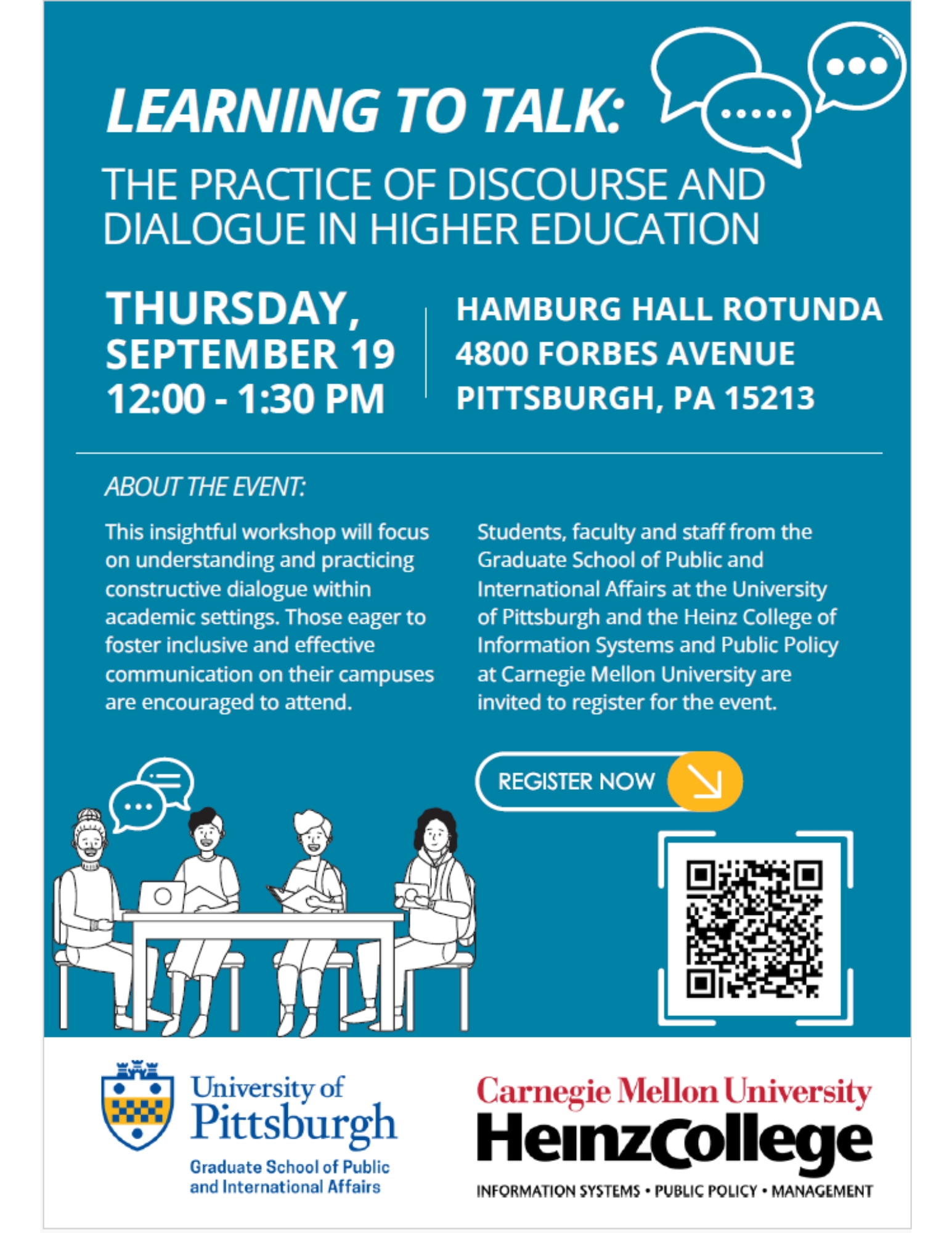
This insightful workshop focused on understanding and practicing constructive dialogue within academic settings. The event focused on fostering inclusive and effective communication.
Students, faculty and staff from the Graduate School of Public and International Affairs at the University of Pittsburgh and the Heinz College of Information Systems and Public Policy at Carnegie Mellon University were
invited to register for the event. -
Deliberative Discourse Fellowship
Civil discourse is a conversation in which we’re trying to promote mutual understanding. "Deliberative Discourse" takes the conversation one step further, into action. Specifically, the goals are a commitment to social good and the prevention of social harm. The Deliberative Discourse Fellow is tasked with collaborating on the design of deliberative discourse events, as well as leading and facilitating events under this initiative.
The Deliberative Discourse Fellow receives a $2,000 per semester tuition scholarship for the duration of their master’s program at Heinz College. In addition to the scholarship, the DDF will work with DICE as an RA. This role would typically require working 7-10 hours per week (earning $17/ hour), during the fall and spring semesters, making them eligible to earn $4,000-$6,000 per academic year.
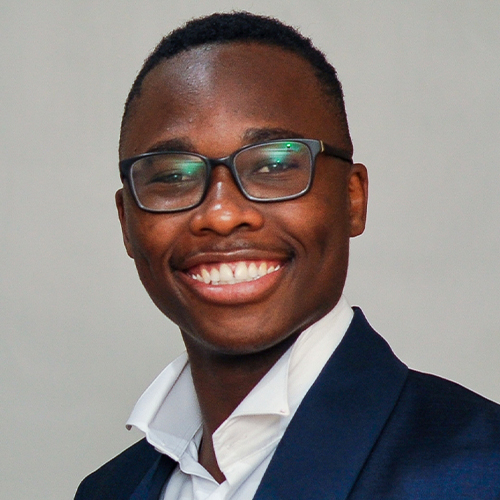 Mburu Kagiri is a second-year masters' student in the PPM-DA track with a background in Data Science and Global Studies. His research areas of interest include Sino-African economic and financial relations, exploring development through micro-financing and economic integration, and understanding what ethical and yet pragmatic regulations of artificial intelligence systems look like.
Mburu Kagiri is a second-year masters' student in the PPM-DA track with a background in Data Science and Global Studies. His research areas of interest include Sino-African economic and financial relations, exploring development through micro-financing and economic integration, and understanding what ethical and yet pragmatic regulations of artificial intelligence systems look like.As the current Deliberative Discourse Fellow, Mburu aims to create spaces for difficult, necessary conversations — about disinformation, activism, and navigating polarizing political discourse — through the lens of accountability. In his free time, Mburu enjoys exploring Pittsburgh on his bike, social dancing, and cheering on his favorite soccer club, Manchester United.
Equipping and Engaging Leaders
Students, staff, and faculty participate in a panel discussion focused on how emerging technologies are shaping our political landscape, in terms of both civil discourse and democratic governance.
